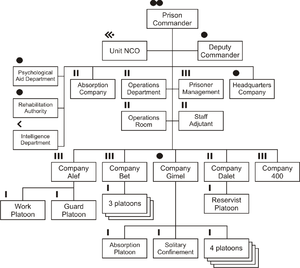- Prison Four
-
Prison Four (Hebrew: כלא ארבע, Kele Arba), officially Confinement Base 394 (Hebrew: בסיס כליאה 394, Bsis Kli'a 394) is an Israeli military prison for Israeli soldiers, located in the military police compound in Tzrifin (Camp Yadin), Israel.
It is the main prison for military prisoners in Israel (the secondary being Prison Six) and can contain approximately 600 prisoners. It is the only prison for Israeli soldiers during an emergency. Prison Four accepts all prisoners except officers, senior NCOs, some military policemen and soldiers who serve in the Northern Command. These go to Prison Six.
Contents
History
Prison Four was founded soon after the 1948 Arab-Israeli War and absorbed prisoners from the provisional jail set up in northern Tel Aviv (al-Shaykh Muwannis) beforehand. It suffered great neglect and overcapacity from the onset, and in 1949, a commission of inquiry was ordered by the Chief of Staff, led by Aluf Moshe Zadok and Aluf David Shaltiel. Prison Six was eventually founded as a result of the extreme overcapacity.[1]
Ever since, Prison Four has been gradually undergoing major changes. The prison was the first to experiment with new ideas in the prison sector, like the operation of security cameras in key locations, as well as the rehabilitation program abbreviated to Gahelet (lit. factors for returning to proper service) in 2000. In 2006, a load of expensive items belonging to prisoners deposited in the prison's safe, were stolen, and in January 2008, the first prisoner in the history of the jail died, although the exact circumstances of his death are not clear. Both events are causing the high command of the Military Police Corps to rethink their approach to the prison system, and install new safeguards.
Syrian prisoner escape
After the Six-Day War, high-quality Arab prisoners of war were kept in regular Israeli military prisoners, including Prison Four. They were given excellent living conditions, including television, dangerous objects and trips to the outside, in order to ensure that the Israeli POWs held in Egypt and Syria would get similar treatment.[2]
On April 16, 1972, three Syrian prisoners were found missing in a morning roll call, and were later confirmed to be escapees. After the initial investigation, the commander of the Manpower Directorate, Aluf Shlomo Lahat, ordered a revokation of all special privileges to POWs held in Prison Four. The deputy Chief Military Police Officer, Colonel Meir Rosenfeld, was responsible for the task, and as a first step informed a cell of Egyptians that their television sets would be revoked. The Egyptians asked for two hours to fomulate a means to have all the prisoners give up their TVs, meanwhile planning a riot. They began fortifying their cells and damaging the weak ceiling. After this became clear to the jailors, an intervention team was formed, although Col. Rosenfeld did not wish to have a violent clash which would endanger either Egyptian or Israeli lives. Rosenfeld personally climbed the roof of the cellblock and fired a bursts around him to scare the Egyptians. One bullet ricocheted and wounded an Egyptian prisoner. The others promptly surrendered, and the injured prisoner died from his wounds.[2]
While the Chief of Staff David Elazar, who arrived at the scene, praised Rosenfeld for his actions, an investigating committee found that he used his weapon illegally. As a result, Megiddo Prison was founded in 1974 to hold certain prisoners of war, as well as problematic Israeli military prisoners.[2]
Structure
At the head of Prison Four stands a lieutenant-colonel, with a major as vice-commander. There are six companies in Prison Four and several other assisting sub-units:
- Absorption Company - accepts new prisoners and sometimes temporarily holds them before they can be transferred to a permanent company. Formerly this company was located outside the prison and had accommodations for prisoners, but this was changed following the mass deposit robbery of 2006. Headed by a lieutenant.
- Company Alef (א) - for prisoners serving sentences of 28 days or less, or those who have less than 28 days till their release. This is an open company, i.e. prisoners sleep in an open (but guarded) area, and not in jail cells. Headed by a captain and can contain up to 120 prisoners.
- Company Bet (ב) - for long-time convicts, usually with sentences above 100 days. Company Bet is known for its harsh living conditions.
- Company Gimel
- Company Dalet
- Company 400 - formerly a separate prison, company 400 is the women's company, and contains all female prisoners.
Company Gimel
Company Gimel (ג) is a closed company for detainees awaiting trial, new prisoners, and some serving medium sentences. It consists of four regular platoons and a fifth absorption platoon, where new prisoners are accepted and sorted. Gimel is the largest company, containing up to 180 prisoners, and its commander is a major instead of a captain.
Company Gimel contains the isolation/solitary confinement wing (Hebrew: אגף הבודדים agaf habodedim), which has 21 cells and 2 full solitary (Hebrew: צינוק tzinok) cells. The regular cells are for separation of prisoners and prevention of harm only - i.e., prisoners are put there if they pose an obvious danger to their surroundings, or are involved in feuds with other prisoners. This is not officially a punishment. A guard from Company Alef is placed incide each cell to guard the dangerous prisoner and prevent suicides, etc. Full solitary (tzinok) cells are used to punish prisoners and any lieutenant or higher in the prison may sentence any prisoner to 24 hours there (up to 1 week for higher-ranking officers).
Company Dalet
Company Dalet (ד) is an open company and the least strict of any of the other companies. While technically intended for reservists, there are two other classes of soldiers who may serve their sentences there. Soldiers aged 22 and above may request placement in Company Dalet, as may soldiers serving in the Nahal Haredi, a battalion made up of Haredi soldiers. The reason for the latter group of soldiers is that female do not serve as jail instructors in Company Dalet, thereby minimizing the Haredi soldiers' exposure to women.
Soldiers in Company Dalet have a lot of free time during the day, and have access to television and a DVD player (in Prison Six this includes satellite TV as well). Apart from the much ligher overall atmosphere, another difference between Dalet and the other companies is that they eat with a full set of silverware. This, in contrast to the other companies' soldiers who only receive spoons at meals.
In 2007, because of the shortage of space for prisoners in both prisons, Company Dalet also began accepting regular prisoners with short sentences and good records. However, Dalet's status is still of a small company, and its commander is a lieutenant instead of a captain.
Assisting units
- Prisoner management unit - headed by a captain, it serves as the adjutant unit for prisoners only.
- Adjutant unit - headed by a lieutenant, it serves as the adjutant unit for regular soldiers serving in Prison Four.
- Operations sector - headed by a lieutenant.
- Operations room
- Mental health sector - provides psychological help for prisoners. Headed by a major.
- Gahelet sector - a sector introduced in 2000, which helps prisoners resume normal service. This sector is operated mostly by female soldiers who pick the soldiers they want to help, instead of the soldier asking for help as with other sectors. Headed by a major.
- Intelligence sector - responsible for collecting intelligence about possible rebellions, etc. Headed by a first sergeant (called an intelligence officer).
See also
References
Categories:- Israel Defense Forces
- Prisons in Israel
Wikimedia Foundation. 2010.


